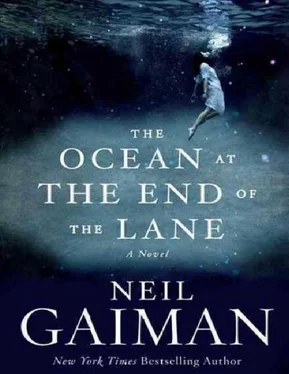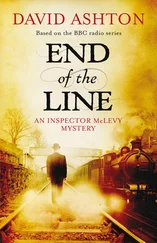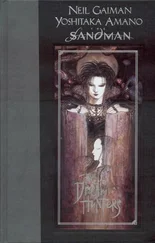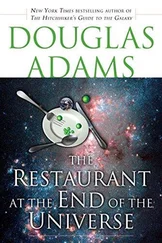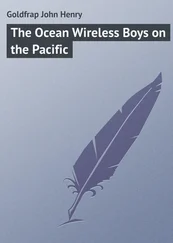“What are they?” I asked.
“You can pull one up and see, if you like,” said Lettie.
I looked down: the furry tendril by my feet was perfectly black. I bent, grasped it at the base, firmly, with my left hand, and I pulled.
Something came up from the earth, and swung around angrily. My hand felt like a dozen tiny needles had been sunk into it. I brushed the earth from it, and apologized, and it stared at me, more with surprise and puzzlement than with anger. It jumped from my hand to my shirt, I stroked it: a kitten, black and sleek, with a pointed, inquisitive face, a white spot over one ear, and eyes of a peculiarly vivid blue-green.
“At the farm, we get our cats the normal way,” said Lettie.
“What’s that?”
“Big Oliver. He turned up at the farm back in pagan times. All our farm cats trace back to him”
I looked at the kitten hanging on my shirt with tiny kitten-claws.
“Can I take it home?” I asked.
“It’s not an it. It’s a she. Not a good idea, taking anything home from these parts,” said Lettie.
I put the kitten down at the edge of the field. She darted off after a butterfly, which floated up and out of her reach, then she scampered away, without a look back.
“My kitten was run over,” I told Lettie. “It was only little. The man who died told me about it, although he wasn’t driving. He said they didn’t see it.”
“I’m sorry,” said Lettie. We were walking beneath a canopy of apple-blossom then, and the world smelled like honey. “That’s the trouble with living things. Don’t last very long. Kittens one day, old cats the next. And then just memories. And the memories fade and blend and smudge together . . .”
She opened a five-bar gate, and we went through it. She let go of my hand. We were at the bottom of the lane, near the wooden shelf by the road with the battered silver milk churns on it. The world smelled normal.
I said, “We’re really back, now?”
“Yes,” said Lettie Hempstock. “And we won’t be seeing any more trouble from her.” She paused. “Big, wasn’t she? And nasty? I’ve not seen one like that before. If I’d known she was going to be so old, and so big, and so nasty, I wouldn’t’ve brung you with me.”
I was glad that she had taken me with her.
Then she said, “I wish you hadn’t let go of my hand. But still, you’re all right, aren’t you? Nothing
went wrong. No damage done.”
I said, “I’m fine. Not to worry. I’m a brave soldier.” That was what my grandfather always said.
Then I repeated what she had said, “No damage done.”
She smiled at me, a bright, relieved smile, and I hoped I had said the right thing.
That evening my sister sat on her bed, brushing her hair over and over. She brushed it a hundred times every night, and counted each brush stroke. I did not know why.
“What are you doing?” she asked.
“Looking at my foot,” I told her.
I was staring at the sole of my right foot. There was a pink line across the center of the sole, from the ball of the foot almost to the heel, where I had stepped on a broken glass as a toddler. I remember waking up in my cot, the morning after it happened, looking at the black stitches that held the edges of the cut together. It was my earliest memory. I was used to the pink scar. The little hole beside it, in the arch of my foot, was new. It was where the sudden sharp pain had been, although it did not hurt. It was just a hole.
I prodded it with my forefinger, and it seemed to me that something inside the hole retreated.
My sister had stopped brushing her hair and was watching me curiously. I got up, walked out of the bedroom, down the corridor, to the bathroom at the end of the hall.
I do not know why I did not ask an adult about it. I do not remember asking adults about anything, except as a last resort. That was the year I dug out a wart from my knee with a penknife, discovering how deeply I could cut before it hurt, and what the roots of a wart looked like.
In the bathroom cupboard, behind the mirror, was a pair of stainless steel tweezers, the kind with pointed sharp tips, for pulling out wooden splinters, and a box of sticking plasters. I sat on the metal side of the white bathtub and examined the hole in my foot. It was a simple, small round hole, smooth- edged. I could not see how deeply it went, because something was in the way. Something was blocking it. Something that seemed to retreat, as the light touched it.
I held my tweezers, and I watched. Nothing happened. Nothing changed.
I put the forefinger of my left hand over the hole, gently, blocking the light. Then I put the tip of the tweezers beside the hole and I waited. I counted to a hundred—inspired, perhaps, by my sister’s hair- brushing. Then I pulled my finger away and stabbed in with the tweezers.
I caught the head of the worm, if that was what it was, by the tip, between the metal prongs, and I
squeezed it, and I pulled.
Have you ever tried to pull a worm from a hole? You know how hard they can hold on? The way they use their whole bodies to grip the sides of the hole? I pulled perhaps an inch of this worm—pink and gray, streaked, like something infected—out of the hole in my foot, and then felt it stop. I could feel it, inside my flesh, making itself rigid, unpullable. I was not scared by this. It was obviously just something that happened to people, like when the neighbor’s cat, Misty, had worms. I had a worm in my foot, and I was removing the worm.
I twisted the tweezers, thinking, I suspect, of spaghetti on a fork, winding the worm around the tweezers. It tried to pull back, but I turned it, a little at a time, until I could definitely pull no further.
I could feel, inside me, the sticky plastic way that it tried to hold on, like a strip of pure muscle. I leaned over, as far as I could, reached out my left hand and turned on the bath’s hot-water tap, the one with the red dot in the center, and I let it run. The water ran for three, four minutes out of the tap and down the plug hole before it began to steam.
When the water was steaming, I extended my foot and my right arm, maintaining pressure on the tweezers and on the inch of the creature that I had wound out of my body. Then I put the place where the tweezers were under the hot tap. The water splashed my foot, but my soles were barefoot- hardened, and I scarcely minded. The water that touched my fingers scalded them, but I was prepared for the heat. The worm wasn’t. I felt it flex inside me, trying to pull back from the scalding water, felt it loosen its grip on the inside of my foot. I turned the tweezers, triumphantly, like picking the best scab in the world, as the creature began to come out of me, putting up less and less resistance.
I pulled at it, steadily, and as it went under the hot water it slackened, until the end. It was almost all out of me—I could feel it—but I was too confident, too triumphant, and impatient, and I tugged too quickly, too hard, and the worm came off in my hand. The end of it that came out of me was oozing and broken, as if it had snapped off.
Still, if the creature had left anything behind in my foot, it was tiny.
I examined the worm It was dark gray and light gray, streaked with pink, and segmented, like a normal earthworm Now it was out of the hot water, it seemed to be recovering. It wriggled, and the body that had been wrapped around the tweezers now dangled, writhing, although it hung from the head (Was it its head? How could I tell?) where I had pinched it.
I did not want to kill it—I did not kill animals, not if I could help it—but I had to get rid of it. Ii was dangerous. I had no doubt of that.
Читать дальше
